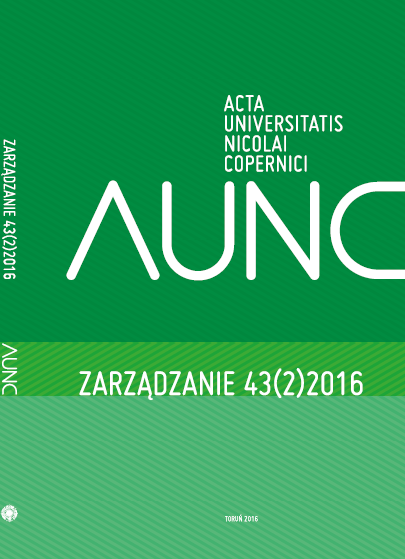THE ROLE OF CUSTOMERS IN THE DEVELOPMENT OF ECO-INNOVATIONS: EMPIRICAL EVIDENCE FROM POLAND
DOI:
https://doi.org/10.12775/AUNC_ZARZ.2016.025Keywords
eco-innovations, customers, users, environmentally sound technologiesAbstract
The aim of this paper is to discuss the role of customers in the development of eco-innovations created by Polish companies-suppliers of environmentally sound technologies. The research is based on in-depth, semi-structured interviews. The paper reveals that companies appreciate information coming from the demand side of the market, strive for it, care about having good relationship with customers, try to keep track of their buying behavior and to focus on responding to their identified needs. Eco-innovations created by the companies-suppliers of environmentally sound technologies in Poland can be seen as user-driven innovations.References
Ansoff I.H., Stewart J.M., (1967), Strategies for a technology-based business, „Harvard Business Review”, nr. 45(6).
Anthony S.D., Eyring M., Gibson L., (2010), Mapping your innovation strategy, [w:] Harvard Business Review on business model innovation, Harvard Business Press, Boston.
Belin J., Horbach J., Oltra V., (2009), Determinants and specificities of eco-innovations – an econometric analysis for France and Germany based on the Community Innovation Survey, DIME.
Bower J. L., Christensen C. M., (2010), Disruptive technologies: catching the wave, [w:] Harvard Business Review on business model innovation, Harvard Business Press, Boston.
Carrillo-Hermosilla J., Del Río P., Könnölä T., (2009), Eco-innovation. When sustainability and competitiveness shake hands, Palgrave Macmillan, New York.
Demirel P., Kesidou E., (2012), On the drivers of eco-innovations: empirical evidence from the UK, „Research Policy”, nr. 41.
Drucker P.F., (1992), Innowacja i przedsiębiorczość. Praktyka i zasady, PWE, Warszawa.
Dyché J., (2002), CRM. Relacje z klientami, Helion, Gliwice.
Enos J.L., (2013), Petroleum progress and profits: a history of process innovation, Literary Licensing, Whitefish.
Foray D., (2006), The economics of knowledge, The MIT Press, Cambridge, London.
Glaser B., Strauss A., (2006), The discovery of grounded theory. strategies for qualitative research, Aldine Transaction, New Brunswick, London.
Gudkova S., (2012), Wywiad w badaniach jakościowych, [w:] Jemielniak, D. (red.), Badania jakościowe. Metody i narzędzia, Wydawnictwo Naukowe PWN, Warszawa.
Hienerth C., Von Hippel E., Baldwin C.Y., (2006), How user innovations become commercial products: a theoretical investigation and case study, „Research Policy”, nr. 35.
Homburg Ch., Grozdanovic M., Klarmann M., (2007), Responsiveness to customers and competitors: the role of affective and cognitive organizational systems, „Journal of Marketing”, nr. 71(3).
Janasz W., Leśkiewicz I., (1995), Identyfikacja i realizacja procesów innowacyjnych w przedsiębiorstwie, Uniwersytet Szczeciński, Szczecin.
Johnson M.W., Christensen C.M., Kagermann H., (2010), Reinventing your business model, [w:] Harvard Business Review on business model innovation, Harvard Business Press, Boston.
Klincewicz K., (2010), Zarządzanie technologiami. Przypadek niebieskiego lasera, Wydawnictwo Naukowe Wydziału Zarządzania Uniwersytetu Warszawskiego, Warszawa.
Luthje C., Herstatt C., Von Hippel E., (2005), User-innovators and “local” information: the case of mountain biking, „Research Policy”, nr. 34.
Mazzanti M., Zoboli R., (2006), Examining the factors influencing environmental innovations, „FEEM Working Paper”, nr. 20.
Muscio A., Nardone G., Stasi A., (2013), Drivers of eco-innovation in the Italian wine industry, International European Forum on System Dynamics and Innovation in Food Networks, Innsbruck-Igls.
Newell F., (2002), Lojalność.com. Zarządzanie relacjami z klientem w nowej erze marketingu internetowego, IFC Press, Kraków.
Peppers D., Rogers M., (2011), Managing customer relationships: a strategic framework, John Wiley & Sons, New Jersey.
Prahalad C.K., Krishnan M.S., (2010), Nowa era innowacji, Wydawnictwo Naukowe PWN, Warszawa.
Prahalad C.K., Ramaswamy V., (2004), The future of competition. Co-creating unique value with customers, Harvard Business School Press, Boston.
Prahalad C.K., Ramaswamy V., (2005), Przyszłość konkurencji. Współtworzenie wyjątkowej wartości wraz z klientem, Polskie Wydawnictwo Ekonomiczne, Warszawa.
Rigby D., Bilodeau B., (2013), Management Tools & Trends 2013, Bain & Company, http://bain.com/Images/BAIN_BRIEF_Management_Tools_%26_Trends_2013.pdf [30.05.2014].
TemaNord, (2006), Understanding user-driven innovation, Nordic Council of Ministers, Norden, Copenhagen.
Tsiptsis K., Chorianopoulos A., (2009), Data mining techniques in CRM: inside customer segmentation, John Wiley & Sons, Chichester.
Urban G.I., Von Hippel E., (1988), Lead user analyses for the development of new industrial products, „Management Science”, nr. 34(5).
Von Hippel E., (1988), The sources of innovation, Oxford University Press, New York, Oxford.
Von Hippel E., (2005), Democratizing innovation, The MIT Press, Cambridge.
White Ch.J., Varadarajan P.R., Dacin P.A., (2003), Market situation interpretation and response the role of cognitive style, organizational culture, and information use, „Journal of Marketing”, nr. 67.
Zook Ch., (2010), Finding your right amount of knowledge, [w:] Harvard Business Review on business model innovation, Harvard Business Press, Boston.
Downloads
Published
How to Cite
Issue
Section
Stats
Number of views and downloads: 809
Number of citations: 0







